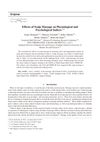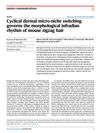 86 citations,
May 2013 in “American journal of obstetrics and gynecology”
86 citations,
May 2013 in “American journal of obstetrics and gynecology” Gynecologists should provide comprehensive care for transgender patients, including mental health evaluation, hormone therapy, and surgical options, while monitoring for side effects and ensuring patient safety.
 68 citations,
January 2008 in “Seminars in reproductive medicine”
68 citations,
January 2008 in “Seminars in reproductive medicine” Women with PCOS often feel stigmatized and have mood issues, which can lower their sexual satisfaction, but proper treatment and support can help.
 6 citations,
October 1997 in “CNS Drugs”
6 citations,
October 1997 in “CNS Drugs” Psychotropic drugs can cause hair loss or excessive hair growth.
 February 2024 in “medRxiv (Cold Spring Harbor Laboratory)”
February 2024 in “medRxiv (Cold Spring Harbor Laboratory)” The study aims to understand how mood, physical activity, light exposure, and seasonal changes affect sleep patterns.
 8 citations,
March 2020 in “Metabolites”
8 citations,
March 2020 in “Metabolites” Finasteride treatment changes urine metabolomics and steroid signatures, potentially monitoring effectiveness but may cause sexual side effects.
 1 citations,
January 2013 in “Journal of S C C J”
1 citations,
January 2013 in “Journal of S C C J” Scalp massage reduces stress, increases relaxation, and improves blood circulation.
 37 citations,
June 2011 in “Journal of Cellular Biochemistry”
37 citations,
June 2011 in “Journal of Cellular Biochemistry” Androgen is important in controlling stem cell differentiation, reducing fat development, and increasing lean mass.
 12 citations,
October 2004 in “Experimental Gerontology”
12 citations,
October 2004 in “Experimental Gerontology” Changes in testosterone and estrogen receptor genes can affect how men age, influencing body fat, hair patterns, and possibly leading to skin disorders.
 26 citations,
January 2020 in “Przegląd Menopauzalny”
26 citations,
January 2020 in “Przegląd Menopauzalny” Menopausal women have higher androgen levels, which can cause symptoms like facial hair growth and low sexual desire.
1 citations,
November 2023 in “Biomedicines” Menopause can cause hair thinning and texture changes due to hormonal and metabolic shifts.
 17 citations,
September 2020 in “Journal of Endocrinological Investigation”
17 citations,
September 2020 in “Journal of Endocrinological Investigation” Post-finasteride patients show changes in gut bacteria, possibly causing various symptoms.
 73 citations,
July 2013 in “The Journal of Sexual Medicine”
73 citations,
July 2013 in “The Journal of Sexual Medicine” Finasteride use changes brain chemicals, causing lasting sexual issues and anxiety/depression.
3 citations,
October 2023 in “Cosmetics” Healthy lifestyle changes can significantly improve skin health as you age.

Early NAS level changes affect alcohol consumption vulnerability.
 September 2022 in “Women's healthcare”
September 2022 in “Women's healthcare” PCOS is managed by lifestyle changes and personalized medication to improve symptoms and fertility.
 11 citations,
January 2016 in “Bipolar Disorder”
11 citations,
January 2016 in “Bipolar Disorder” Valproate is a mood stabilizer for bipolar disorder but has side effects and risks, especially during pregnancy.
9 citations,
January 2022 in “Biology” Male mice are more susceptible to autism-like changes from valproic acid than female mice.
 January 2023 in “Food and nutrition sciences”
January 2023 in “Food and nutrition sciences” Most people using the supplement Renew saw health improvements, especially in sleep and energy, faster than with regular vitamins.
 48 citations,
January 2011 in “Hormone Research in Paediatrics”
48 citations,
January 2011 in “Hormone Research in Paediatrics” The conclusion is that genetic changes in the glucocorticoid receptor can lead to conditions affecting stress response, immunity, and metabolism, requiring personalized treatment.
22 citations,
August 2021 in “Frontiers in medicine” Immune cells in Hidradenitis suppurativa become more inflammatory and may be important for treatment targets.
 January 2017 in “Journal of clinical & experimental dermatology research”
January 2017 in “Journal of clinical & experimental dermatology research” The case shows skin changes can indicate deeper health issues like insulin resistance, which are challenging to manage.
 26 citations,
August 2014 in “PubMed”
26 citations,
August 2014 in “PubMed” Testosterone improves mood and thinking skills; finasteride has no effect.

The interdisciplinary approach improved the quality of life for a Parkinson's patient and eased staff workload.
 16 citations,
January 2006 in “The Aging Male”
16 citations,
January 2006 in “The Aging Male” Hormone imbalances can cause skin diseases, and understanding these links is important for diagnosis and treatment.
 62 citations,
August 2014 in “BMC Endocrine Disorders”
62 citations,
August 2014 in “BMC Endocrine Disorders” New findings explain how genetic changes, body clocks, and certain molecules affect tissue response to stress hormones.
 1 citations,
September 2012 in “Expert Review of Endocrinology & Metabolism”
1 citations,
September 2012 in “Expert Review of Endocrinology & Metabolism” Androgen replacement therapy can improve libido and mood in women with severe androgen deficiency, but more research is needed on its long-term safety.
 January 2022 in “IntechOpen eBooks”
January 2022 in “IntechOpen eBooks” Some lesser-known causes of PCOS include autoimmune issues, genetic mutations, and changes in the body's microbiome.
 59 citations,
August 2004 in “Human Reproduction Update”
59 citations,
August 2004 in “Human Reproduction Update” Testosterone replacement can help women with low libido and mood, but they need to have enough estrogen first to avoid side effects.
 January 2015 in “Springer eBooks”
January 2015 in “Springer eBooks” The document concludes that managing PCOS involves lifestyle changes, medication, and monitoring for associated health risks.
 4 citations,
August 2023 in “Nature Communications”
4 citations,
August 2023 in “Nature Communications” Mouse zigzag hair bends form due to a 3-day cycle of changes in hair progenitors and their environment.

























